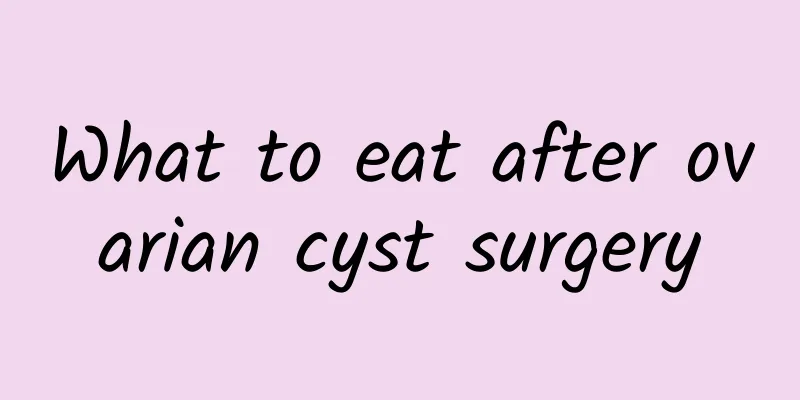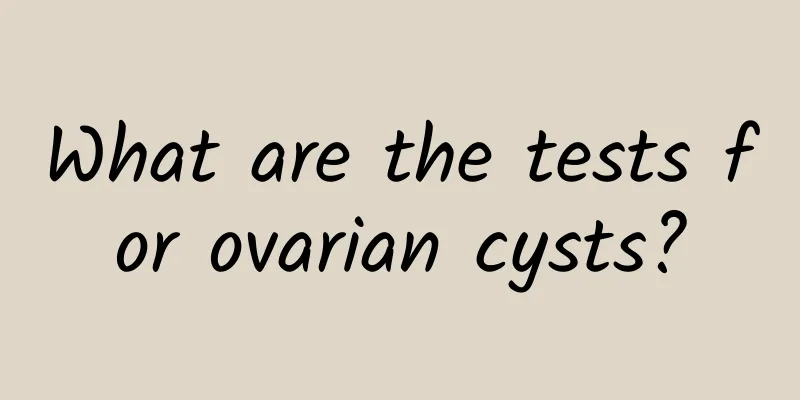What to eat after ovarian cyst surgery

|
Ovarian cysts can be treated with surgery, such as ovarian cystectomy, oophorectomy, total hysterectomy, and adnexectomy, which can help improve the disease and relieve discomfort. However, after ovarian cyst surgery, relevant care and auxiliary treatment are needed to promote disease recovery. So how to do postoperative care for ovarian cysts? What are the dietary requirements? 1. Milk: After ovarian cyst surgery, patients should pay attention to a light diet and eat more liquid and easily digestible foods, such as milk. This food is not only easy to digest, but also contains a lot of protein. Eating more is good for health. 2. Spinach: Postoperative patients can also eat spinach in moderation, because spinach has the effects of nourishing blood and stopping bleeding, moistening the intestines and promoting bowel movements. Eating it in moderation can also assist in treatment and promote recovery from the disease. 3. Yam: Yam has the effect of nourishing the spleen and stomach, nourishing the lungs and nourishing yin. Eating it in moderation not only helps improve gastrointestinal function, but also prevents complications, reduces the harm of diseases, and protects one's health. 4. Dates: Dates have the function of regulating qi and blood. Eating them in moderation can also improve diseases and reduce discomfort. However, spoiled dates should not be eaten to avoid harming health and affecting recovery from illness. 5. Peanuts: Peanuts have powerful effects. They can not only nourish the stomach and promote digestion, but also lower blood lipids and prevent arteriosclerosis. Eating more can also help recover from the disease. 6. Crucian carp: Postoperative patients can also eat more crucian carp, because crucian carp has the effects of strengthening the spleen and stomach, promoting diuresis and reducing swelling. Eating more crucian carp can help improve gastrointestinal function, promote nutrient absorption, and accelerate disease recovery. After ovarian cyst surgery, you can eat more of these six foods, which is very helpful for the recovery of the disease. Patients should also be reminded that when choosing these foods, they must pay special attention to freshness. Deteriorated and stale foods should not be eaten, so as not to aggravate postoperative discomfort and affect the recovery of the disease. Patients should also pay attention to closely observe postoperative changes. If there are abnormal symptoms, they must seek medical attention in time to avoid postoperative complications and harm to health. |
<<: What are the hazards and causes of pelvic effusion?
>>: Symptoms of early menopause
Recommend
What are the precautions after childbirth? Pay attention to these 9 points
Miscarriage is also very harmful to the mother, a...
What are the symptoms of threatened miscarriage?
What are the symptoms of threatened abortion? I b...
How to deal with irregular menstruation? A complete guide to women's care, easily regulate your period!
Irregular menstruation is a problem faced by many...
Analysis of precautions for preventing cervical erosion
In order to effectively prevent cervical erosion,...
What is the cause of recurrence of candidal vaginitis?
In fact, candidal vaginitis is vaginitis caused b...
How should women treat cervical erosion? Traditional Chinese medicine treatment methods for cervical erosion in women
Recipe: 1. Egg white can treat cervical erosion [...
How are uterine fibroids caused? 5 symptoms of uterine fibroids to pay attention to
How are uterine fibroids caused? Here are 5 sympt...
How to care after miscarriage?
How to care after miscarriage? Whether it is an a...
Analysis of medication issues after abortion
After an unexpected pregnancy, many female friend...
What to do if there is fluid accumulation in the uterine rectal fossa due to adenomyosis
Adenomyosis, uterine rectal fossa fluid accumulat...
What are the causes of menopause in women?
In life, some postmenopausal women will experienc...
Uterine fibroids cause pleural effusion. Why can uterine fibroids cause pleural effusion?
Why does uterine fibroids cause pleural effusion?...
What should women do if they have irregular menstruation? Women with irregular menstruation can eat these 9 kinds of food
What should women do if they have irregular menst...
Several common modern treatments for cervicitis
The cervix is a relatively complex organ in the...
How long does it take to get the abortion pills? What are the processes of medical abortion?
If a woman gets pregnant unexpectedly before she ...









